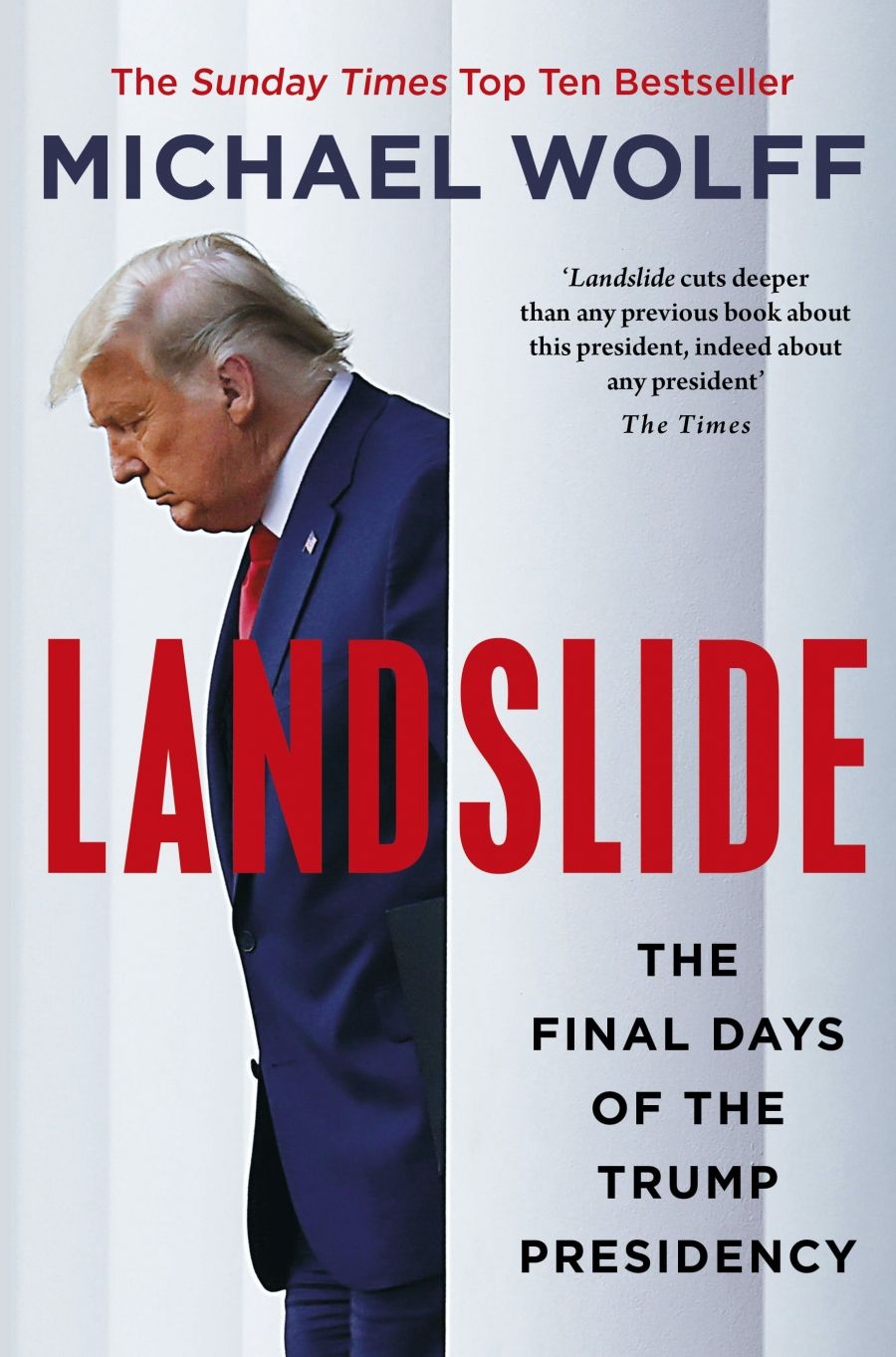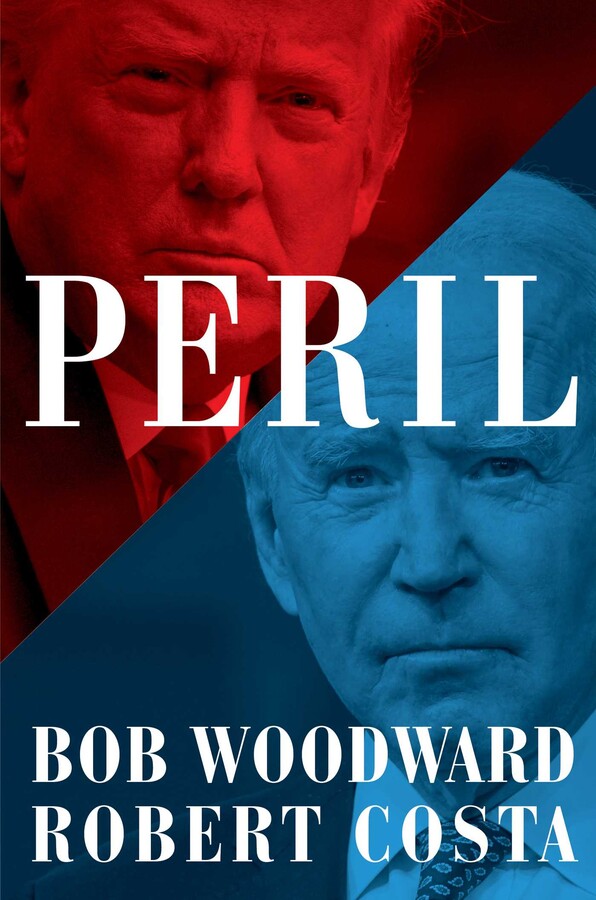
- Free Article: No
- Contents Category: Politics
- Review Article: Yes
- Article Title: Chaos chronicles
- Article Subtitle: Donald Trump’s last days in office
- Online Only: No
- Custom Highlight Text:
The Trump presidency (2017–21) has generated more books across its four years than most presidencies have across eight. It is ironic that an avowedly anti-intellectual president, who advertises his dislike of reading, has had such a profound impact on political literature. These two books – Landslide and Peril – will likely remain the most read of that growing collection. As their titles suggest, each is a chronicle of the chaos that consumed the United States during and after the 2020 election campaign.
- Article Hero Image (920px wide):

- Article Hero Image Caption: President Donald J. Trump in the Oval Office of the White House, 21 March 2020 (Official White House Photo by Tia Dufour)
- Alt Tag (Article Hero Image): President Donald J. Trump in the Oval Office of the White House, 21 March 2020 (Official White House Photo by Tia Dufour)
- Featured Image (400px * 250px):

- Alt Tag (Featured Image): Timothy J. Lynch reviews 'Landslide: The final days of the Trump presidency' by Michael Wolff and 'Peril' by Bob Woodward and Robert Costa
- Book 1 Title: Landslide
- Book 1 Subtitle: The final days of the Trump presidency
- Book 1 Biblio: The Bridge Street Press, $49.99 hb, 326 pp
- Book 1 Readings Link: booktopia.kh4ffx.net/YgLoWq
- Book 2 Title: Peril
- Book 2 Biblio: Simon & Schuster, $49.99 hb, 510 pp
- Book 2 Cover Small (400 x 600):

- Book 2 Cover (800 x 1200):

- Book 2 Cover Path (no longer required): images/1_SocialMedia/2021/Dec_2021/META/Peril.jpg
- Book 2 Readings Link: booktopia.kh4ffx.net/MXgjaN
Bob Woodward’s methods are well known and consistently effective. He wines and dines his sources at his DC home. They begin to open up. Trust obtains. In short order, across his many books, senior officials give him the rough draft of history. His books are unavoidable, and have been since the 1970s. His pull is immense, his bank balance healthy. His critics, often jealous, decry his ubiquity but also his over-reliance on the people most receptive to his attentions.
Despite his early fame as a co-author (with Carl Bernstein), Woodward now usually writes alone, though he has a large team of researchers on hand. For Peril, his third book on the Trump presidency, he has partnered with the Washington Post ’s somewhat pedestrian Robert Costa. Neither author can make their prose sing. The drama inherent in the story they relate is belied by the prosaic style. I have never enjoyed reading a Woodward book. I own them all, have read each one out of a sense of scholarly obligation, but rarely revisit them. They are important but strangely unsatisfying as reading experiences.
The issue is not simply stylistic. Woodward and Costa become ciphers for sources animated by their professional need to distance themselves from Donald Trump – except, of course, for Trump himself, who did, rather too casually, grant Woodward an audience. This exchange reveals little more about the president’s motivation and character than we were able to glean from his public utterances.
Peril uses General Mark Milley, the nation’s senior military officer and chairman of the Joint Chiefs of Staff under Trump, for much of its narrative reconstruction as well as its moral tone. Milley is the sort of man who is inclined to be sceptical of Donald Trump. The Bostonian soldier disdains the New York television personality. He secretly tells the Chinese government to ignore him. He sides with Trump’s nemesis, Nancy Pelosi, in this intrigue. He refuses to allow his boss to exploit the US military for his own political purposes. Across the book, Milley works to negate Trump’s excesses. He becomes one of several officials who revealed to the authors how they struggled to maintain decency as Trump descended into delusion.
Michael Wolff is unlikely to match Woodward’s reputation. His public persona reeks of self-promotion. But Landslide, his third book on Trump, deserves to be regarded alongside that of the Watergate journalist. Wolff has written a consistently interesting and appropriately judgemental account of Trump’s efforts to elide reality. He manages to be both damning and sympathetic towards the forty-fifth president. Few authors pull this off. Take, for example, his depiction of the team that surrounds Trump. ‘Yes’ men and women for the duration of the administration, in its final weeks, they avoided conveying bad news to the boss. This opens him up to the designs of a ‘hapless band of co-conspirators … too crazy or drunk or cynical’ to be any use to a flailing president. From Rudy Giuliani, and his melting toupee, to the reality-detached lawyer Sidney Powell, these misfits give Trump the advice that made certain he would leave office facing the shame of impeachment.
The analogy to Adolf Hitler was always overdone in the rhetoric of his detractors. But there is something of the Berlin bunker in Wolff’s account of Trump’s final presidential days. Giuliani moves around subpoenas – futilely challenging state election results – like so many non-existent troops, each offering the leader false hope that salvation is within reach. The shrewder staff and family, like his son-in-law, Jared Kushner, ease themselves out as the Giuliani conspiracists move in. The chapter ‘Rudy’ is Wolff’s best:
It was a measure of Giuliani’s need, character, and stamina in the face of mockery, rejection, and a wide range of bureaucratic remedies to block his access to the avenues of power ... that he nevertheless became such a central figure in Trump’s presidency. It was a measure, too, of Trump’s own constant search for alternatives to standard advice and counsel. As much as even he mocked Giuliani – and Trump was often withering in his contempt – he invariably turned to Rudy when he was the only man saying what the president wanted to hear.
And yet, as Wolff makes clear, this was a presidency that came remarkably close to re-election. Its descent into fantasy as the postal ballots came in should not obscure the likelihood that, without Covid-19, the Trump administration could now be entering its sixth year. He got more votes than any Republican candidate in American history (seventy-four million) and a larger share (twenty-six per cent) of the votes from people of colour than any GOP candidate since 1960. There was nothing inevitable about his 2020 defeat. This was why he so manically challenged that result.
Trump was not joined in this doomed attempt by his vice president. The real hero of both accounts is Mike Pence, who had earned the opprobrium of the Democrats for his facilitation of Trump. When the real crisis erupted on 6 January, it was Pence who, coolly and despite enormous psychological and physical pressure, decided to tally the electoral college votes and to uphold the US Constitution. Pence deserves his rehabilitation as surely as anyone documented in these pages.
Woodward and Costa, unlike Wolff, balance their account of the Trump fall with that of Biden’s rise – ironically from an actual bunker. But for sheer enervation, this parallel narrative of the hoped-for return of normalcy to America is hard to beat. We get only intimations of the dysfunction that now afflicts the Biden administration (the hapless Kamala Harris vice presidency is not prophesied). The story of both books, unsurprisingly and unavoidably, is Donald Trump. And yet we leave each account not knowing much more about him than we did before the authors’ sources were tapped. This is less because Trump is a riddle, wrapped in a mystery, inside an enigma (as Winston Churchill described Soviet Russia). Rather, it is because Trump the man is banal. ‘[W]ho knew what was in Trump’s mind?’ Wolff asks repeatedly. Trump has nothing intriguing to relay. His seemingly exclusive lens is television. He disdains reading. He avoids the boost to imagination that alcohol can bring. He is not much more than a set of instinctive and predictable responses to political and cultural stimuli. What becomes compelling, but under-analysed, in both books, is how far such a nonentity in intellectual and emotional terms could command such allegiance from his immediate advisers and his more distant voter base. Neither book really offers an explanation for that. Why did he command such loyalty? Why might he again?
One answer, which these books implicitly offer, is Trump’s imperviousness to reason and logic. Woodward, Costa, and Wolff present numerous examples. How will the postal votes be thrown out? Via a fantastical set of lawsuits against myriad states. When this fails? The ‘Supremes’, his three appointees to the US Supreme Court, will overrule the result. If they don’t? Mike Pence will refuse to affirm it on the Senate floor. If he refuses? He must be pressured to do so. At no point did the infeasibility of each answer occur to the man asking the questions. And yet this complicity in unreality, this willingness to defy every convention of normal political behaviour, served to reinforce his image as a great disruptor. It remains the basis, despite some damning evidence presented in these books, of his likely next run for the presidency in 2024.



Comments powered by CComment